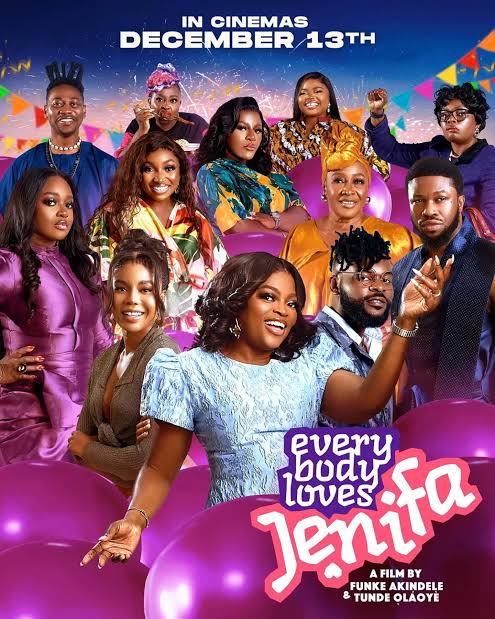Funke Akindele, the undisputed “Queen of Box Office,” has once again proven her mettle as a top actor, filmmaker, and marketing guru in Nollywood.
Her latest blockbuster, Everybody Loves Jenifa, has been generating immense buzz since its promotional campaign kicked off. But does the film live up to its hype?
The movie starts on a promising note, with Jenifa living her best life in Amen Estate. Her business is booming, and her NGO is making waves.
However, trouble soon shows up in the form of Mr. Lobster, a domestic violence assailant and fraudster disguised as a philanthropist. As the story unfolds, Jenifa’s life takes a chaotic turn, marking the beginning of a whirlwind that takes her from Nigeria to Ghana.
While the film’s casting is undoubtedly a highlight, with a star-studded lineup that includes fan favorites, the plot struggles to keep up. The narrative feels rushed and inconsistent, splitting into two chapters that fail to coalesce into a cohesive whole.
The switch between a Nigerian domestic drama and a chaotic thriller in Ghana keeps things dynamic, but ultimately feels like a disjointed attempt to pack too much into one film.
Despite its flaws, Everybody Loves Jenifa has its moments. The cinematography is top-notch, with carefully chosen lighting and camera angles that effectively set the mood and tone. The technical execution is exemplary, a testament to the production team’s expertise and commitment to visual storytelling.
However, the lack of a compelling storyline and creative depth cannot be ignored.
While the film will undoubtedly leave fans of Jenifa’s Diary grinning and excited, those seeking a film with rich storytelling and artistic innovation may find themselves disappointed.
‘Everybody Loves Jenifa’ is a mixed bag of laughter and chaos. While it touches on ambition, justice, romance, and resilience via comedy, it struggles to stay focused and deliver a cohesive narrative.
Its commercial success is undeniable, but there’s significant room for improvement, particularly in its storytelling and artistic vision. She keeps thriving with her talent, versatility, marketing skills, and exceptional movie productions that captivate audiences across the globe.
Insight into the movie:
The film starts with Jenifa living her luxurious life in Amen Estate. Her business is booming, and her NGO is making waves. As the story unfolds, trouble shows up in the form of Mr. Lobster (Stan Nze), a domestic violence assailant and fraudster disguised as a philanthropist. Jenifa witnessed a violent uproar between Mr. Lobster and his wife which marks the beginning of her chaotic whirlwind.
Moving on, the major focus of the movie begins to change. The plot struggles to keep up.
It splits into two chapters: a Nigerian domestic drama and a chaotic thriller in Ghana. While the switch keeps things dynamic, it feels rushed and inconsistent.
The casting was undoubtedly a highlight. Infact, the film was star studded. Funke Akindele demonstrated her deep understanding of the Nigerian audience by filling the cast with fan favorites. We can all tell that was indeed a strategic move, ensuring that viewers were drawn in by the star power of their favorite actors. Each character was well-matched to their role, and this synergy brought a level of authenticity to the performances. However, some characters were quite unnecessary. Characters like that of Destiny Etiko, Patience Ozokwo(Mama G), Lateef Adedimeji, among a host of others could have been exempted and it won’t affect the plot.
The cinematography stands out as one of the film’s notable achievements. The lighting and camera angles were carefully chosen to set the right mood and tone effectively. These angles were thoughtfully selected, enhancing the storytelling and immersing the audience in the narrative. The technical execution was top-tier. This is a testament to the production team’s expertise and their commitment to visual storytelling.
Everybody Loves Jenifa is a mixed bag. It touches on ambition, justice, romance, and resilience via comedy. The film comprises moments of cheers, laughter, and humour- this will keep the viewers entertained.
It explores serious themes like domestic violence, deceit, and power dynamics, but struggles to stay focused. The narrative tries to be both personal and grand, but often relies on the audience’s existing love for Jenifa rather than earning it.
The heart of the story is there, but the delivery feels chaotic. While its cinematography, casting, and marketing are exemplary, the lack of a compelling storyline and creative depth cannot be ignored.
For viewers who are huge fans of Jenifa’s Diary, it’s a nostalgia-heavy, slightly chaotic movie that will leave them grinning and excited.
However, for those seeking a film with rich storytelling and artistic innovation, this might not satisfy.









